Covid-19: The Southend fans missing their 'football families'
- Published
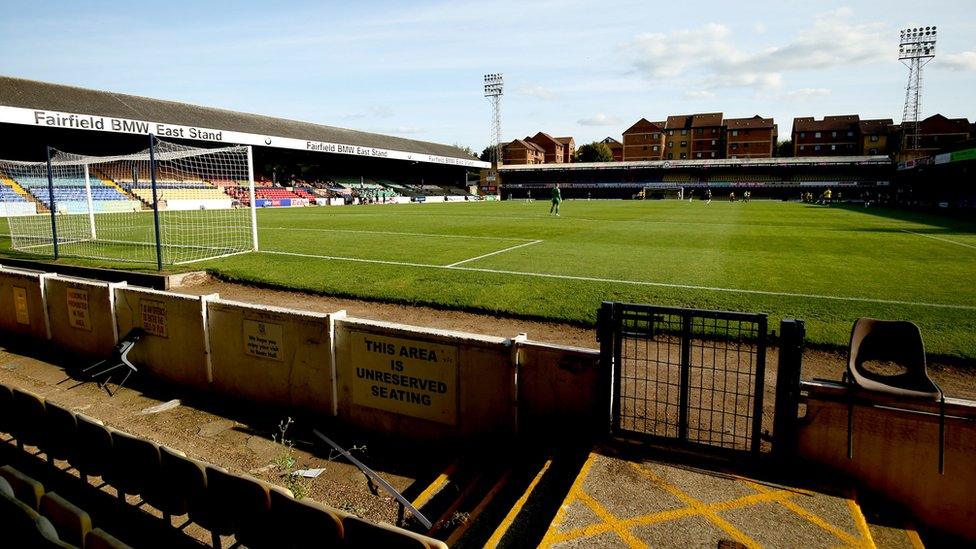
Clubs have now been told by the government to prepare for several more months without gate receipts
In warning the government about the peril facing English football's national league structure, a group of prominent figures wrote that the game was far more than a sport. It was, they said, it was "a cultural activity". What has the past six months been like for the fans who follow their team's fortunes through thick and thin?
A football match is not merely the 90 minutes played out on the pitch, says David Bishop, an ardent supporter of League Two side Southend United.
"It's the getting up in the morning and getting ready, the thinking about the game beforehand, the drive there, the popping into the fish and chip shop and seeing your friends before the match," he said. "I really miss it."
A former Tottenham Hotspur fan, Mr Bishop's first taste of Southend United happened after he moved from east London to the Essex seaside town.
Recovering from a stomach operation back in 2001, he was invited by a friend who had a spare ticket to see Southend United take on Burnley at Roots Hall.
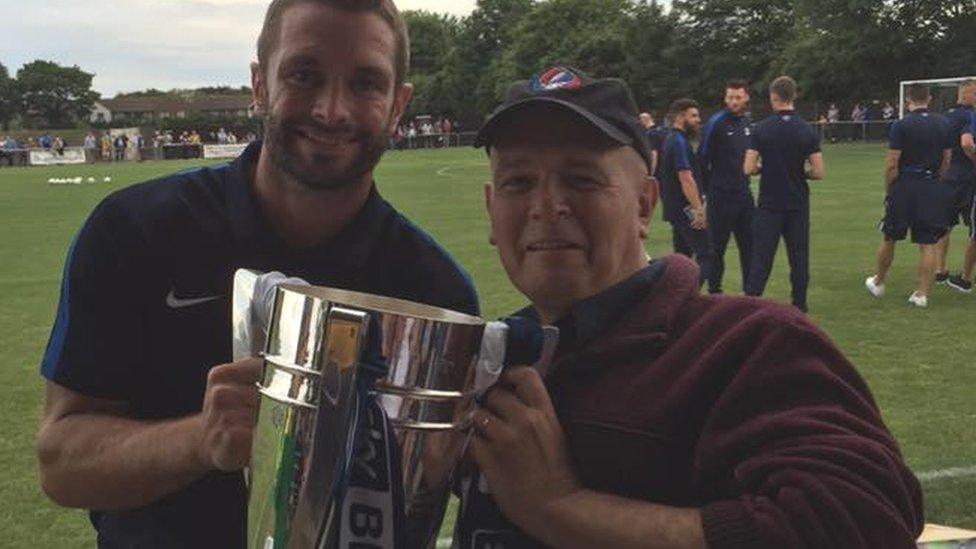
David Bishop (right) with John White, who captained Southend to their play-off victory at Wembley in 2015
"I wanted to get out of the house so I went along and really enjoyed it and I've been going ever since," said Mr Bishop.
"I think if the current situation has definitely proven one thing in football it is that you need fans in the ground.
"Watching Southend in recent years has not exactly been a great experience. But the football on the pitch is merely a part of it. You go to see the people, your friends.
"There's the camaraderie, sharing the ups and the downs - it does become like having an extended family.
Mr Bishop told how when an elderly Southend supporter died a few years ago, the alarm was not raised by neighbours, or friends, but by fellow football fans who noticed he had missed two consecutive games.
Fellow supporters went to his home, contacted the emergency services and the man's body was found inside by the police.
Many clubs had been preparing to welcome fans back into their grounds on 1 October until rising Covid-19 case numbers meant those plans were abandoned.
Clubs have now been told by the government to prepare for several more months without gate receipts.

Southend United Factfile
Founded in 1906, Southend United - nicknamed The Shrimpers - are based at Roots Hall, which has a 12,392 person capacity
Currently in League Two following relegation from League One in 2019-2020
Their biggest local rival is fellow Essex club Colchester United
Manager Mark Molesley was appointed in August on a three-year contract
The club hopes to settle the debt through refinancing, with more than 500 homes planned for Roots Hall after it moves to a planned new ground at Fossetts Farm.

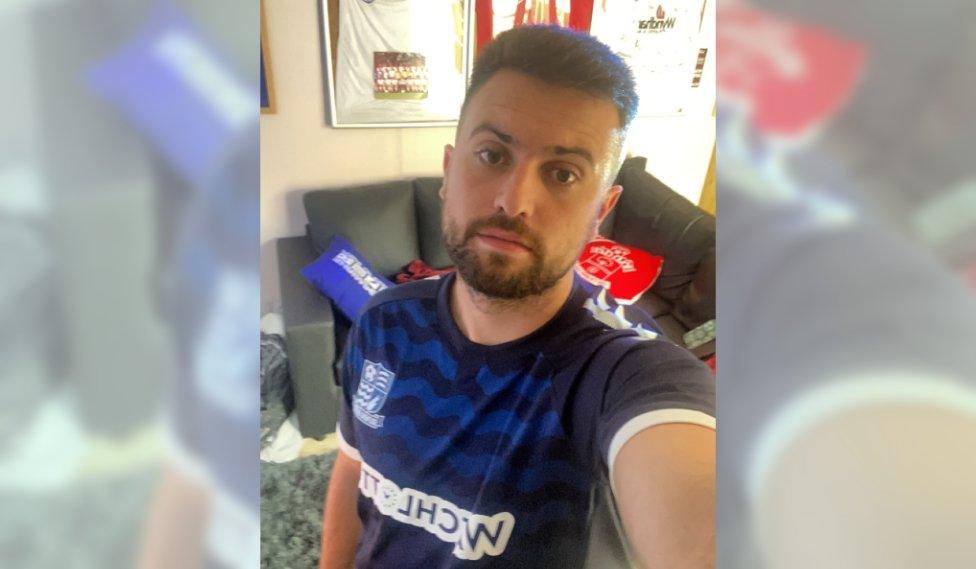
"Nothing can compare to watching your beloved team live," says Southend fan Jack Lawrence
A Southend season ticket holder for nearly 20 years, Jack Lawrence warned it was not just club finances that were in jeopardy - so too, he said, was the mental health of the nation's hundreds of thousands of football fans.
"I go to every home game and every away game if possible," he said. "I miss the excitement around a match day and nothing can compare to watching your beloved team live.
"I think (the sense of) community and friendships in following your club are important. Come Saturday you forget everything that's going on in your life and just support your team for 90 minutes.
"It's so important for people's mental health, which is why it's important we get stadiums open as soon as possible."
Getting out to a match can, for some, be a vital respite from their worldly responsibilities.
Steve Shelsher has followed Southend's fortunes for the past three decades. Before the pandemic, he went to home matches with his friend, his father-in-law and his father-in-law's friend.
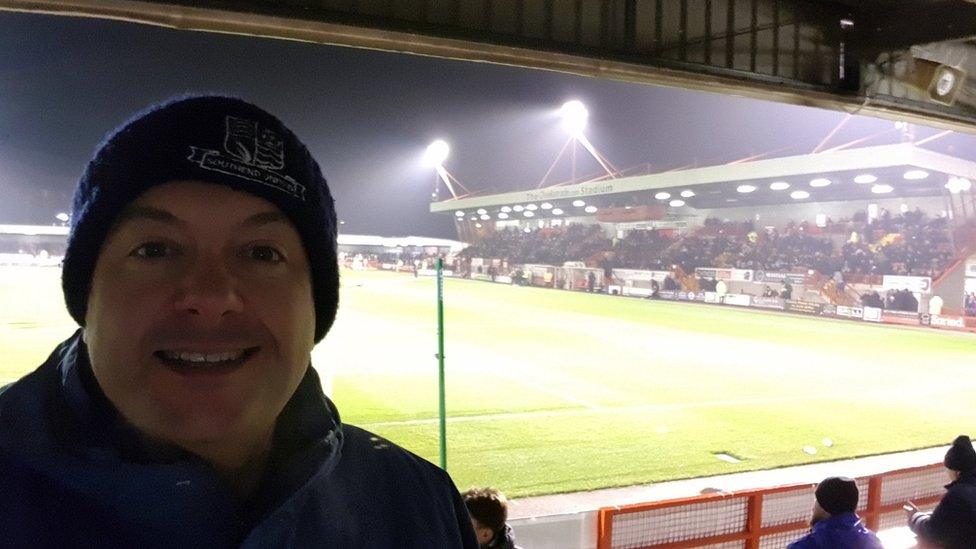
A chilly day out: Steve Shelsher at an away game against Crawley Town before the coronavirus pandemic
For his father-in-law, getting out for a couple of hours at the weekend to see Southend play provided a hugely important break from his caring responsibility for his wife, who has dementia.
"It has been very tough for him," said Mr Shelsher, "because going to games was respite for him.
"I guess it can be respite for all of us though. If you've had a bad day at work, or whatever, you get to vent off at a referee or one of the other team's unfortunate players."
Following a football team can, said Mr Shelsher, play funny tricks on the mind.
"When my two children were younger I sometimes didn't go to a match," he said. "If we lost, I always felt that was partly down to me not being there."
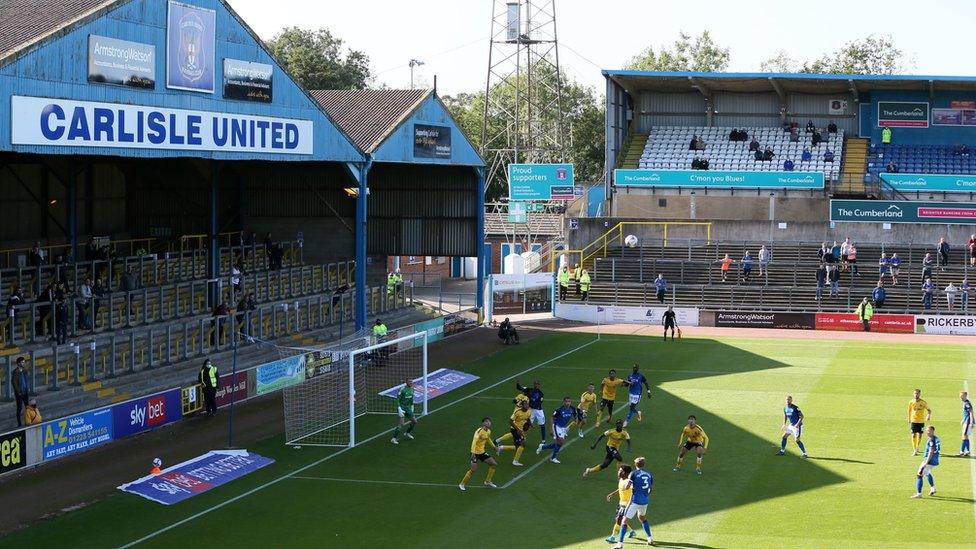
Southend were able to play in front of 1,000 fans last month before the brief trial of socially-distance crowds was ended - but it was away to Carlisle and only home supporters could attend
So, as Southend struggled last season - before eventually being relegated - Mr Shelsher responded not by attending fewer of the usually disappointing games, but by going to more.
"I made a decision not just to attend the home matches but to go to as many away games as I could too.
"So I ended up driving up to Peterborough and Oxford on my own to support them."
As for the club itself, Southend United said its fans were "certainly missed" and has tried to come up with various ways of staying in touch with supporters.
As well as connecting with fans online, the club has asked supporters to send in their flags to be draped across the seats at the ground's East Stand and behind both goals.

David Ross has been appointed chairman of a new task force whose aim is to find ways of getting fans back into sports stadiums safely
In the wake of the Prime Minister's September announcement postponing the reopening of higher level football grounds to fans, external, the Department for Culture, Media and Sport said it was creating an independent task force to focus on getting supporters back into elite sports venues.
David Ross, chairman of the newly formed task force, said: "We know how crucial sport is to the social fabric of our communities as well as the local businesses who rely on it for income in towns and cities across the country.
"This group of experts will do all it can to come up with solutions that can help bring back live sport for the millions of fans who are missing it as much as we do."

IMMUNITY: Can you catch it twice?
SOCIAL DISTANCING: How have rules on meeting friends changed?
FACE MASKS: When do I need to wear one?
TESTING: How do I get a virus test?


Find BBC News: East of England on Facebook, external, Instagram, external and Twitter, external. If you have a story suggestion email eastofenglandnews@bbc.co.uk, external